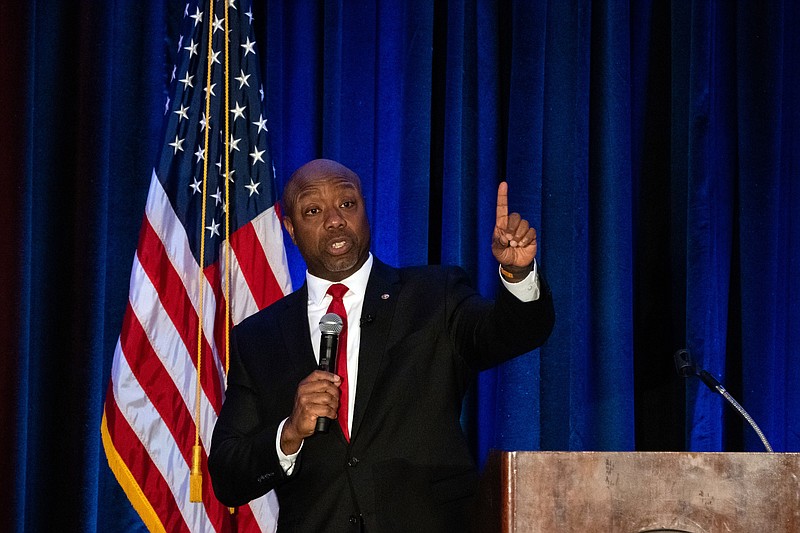Here we go again. A qualified, conservative, likable Republican gets into the GOP presidential primary against Donald Trump. And then so does another one, and another, and another until eventually, the race becomes a blob of Donald Trump vs. everyone else.
We saw that movie before in 2016, and the sequel continued last Monday as U.S. Sen. Tim Scott of South Carolina threw his hat into the ring for president.
Scott has been one of the most liked, and even beloved, members of the United States Senate since then-Gov. Nikki Haley appointed him to replace Jim DeMint in 2013. As the second Black Republican elected to the Senate since Reconstruction, he's got a personal story so remarkable you could turn it into a movie. He has a record so conservative Ralph Reed could have chartered it himself. And Scott is so genuinely down-to-earth that fellow members of Congress report seeing him reading his Bible on the plane to and from Charleston when the Senate is not in session.
In any other year, without Donald Trump on the ballot, you'd think Republicans would jump at the chance to make him their nominee. But with Trump in the race, looming loud and large, it's not at all clear simmering GOP voters will go for Scott's brand of nice.
On Monday, the 57-year-old lawmaker began his stump speech with a smile, and nearly the same way U.S. Sen. Raphael Warnock does, by describing how his grandfather once made a living picking cotton, only for his grandson to go to Congress within two generations.
"That's the evolution of the country we live in," Scott said. "That Black man, who struggled through the Jim Crow South, believed then what some doubt now, in the goodness of America."
Scott is the exact kind of candidate who Republicans should nominate to run, and possibly win, against President Joe Biden in 2024, whose age and economic headwinds make him vulnerable in a battleground state like Georgia this time around.
But if history is our guide, Scott realistically won't have a chance in the GOP primary, even with $22 million in the bank and at least one billionaire in the audience when he made his announcement at Charleston Southern University Monday.
That's not a comment on Scott, but on the growing field running in the primary against Trump -- again -- in a repeat performance of 2016 when 16 Republicans split the non-Trump field.
Scott now joins a presidential field that already includes former South Carolina Gov. Nikki Haley, Florida Gov. Ron DeSantis, former Arkansas Gov. Asa Hutchinson, entrepreneur Vivek Ramaswamy, and conservative radio host Larry Elder. Former Vice President Mike Pence is expected to get into the race soon.
Former New Jersey Gov. Chris Christie, New Hampshire Gov. Chris Sununu and Virginia Gov. Glenn Youngkin have all said that they are considering a run, too.
In a sign of just how seriously Trump isn't taking Scott's candidacy, he reached for his social media Monday and said something nice after Scott announced he's running. "Tim is a big step up from Ron DeSanctimonious, who is totally unelectable," Trump wrote.
In reality, Trump may be the one Republican who is totally unelectable against Biden. Which voters has he won over since losing to Biden in 2020, with Jan. 6, another impeachment, a criminal indictment and a liable verdict in a rape case all happening since then?
But the bigger the GOP field gets, the better it is for Trump and the harder it is for the non-Trump candidates to break through.
The senator ended his speech as he began, smiling, but this time on a note so optimistic only time will tell if GOP voters are in the mood to make it true in 2024.
"We live in the land where it is possible for a kid raised in poverty by a single mother in a small apartment to one day serve in the People's House, and maybe even the White House," he said. Maybe.
The Atlanta Journal-Constitution
